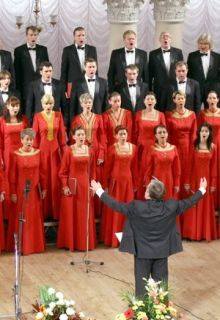The 21st International Festival of Academic Music is over. Traditionally, Kyiv Music Fest was held by the National Union of Composers of Ukraine. Seeking to defend its status as the most representative forum of modern classical culture in Ukraine, every year Kyiv Music Fest tries to present as many authors and musical works as possible. However, this year’s program is impressively eclectic. Styles, aesthetics, schools, epochs, ideologies, and generations intertwined not only within the forum’s framework, but sometimes in particular concerts.
Actually, eclecticism and absence of thematic core in the concert programs of Kyiv Music Fest are the reason why it has been so heavily criticized over the past ten years (the festival exists for over 20 years). The criticism is hurtful for the organizers. The stand of the organizing committee is quite clear: the immanent concept of the festival is that it should present composers’ works, which means that everything (or almost everything) should be presented at the forum. The works of openly untalented composers are not performed here, but not all works of renowned authors are equally good — frequently there are very weak opuses. Besides, the organizers did not stick to the principle of harmony between various authors and styles. Such an approach, though presenting the whole panorama of modern music as it is, also produces chaos.
Why not try to view the composers’ activity as a somewhat organized, “intelligent,” not spontaneous process, which could be part of the festival’s strategy. Through the system of scheduled orders, the authors, potential participants of the festival, could receive the topic, genre, and lineup of performers beforehand. Moreover, the composers, generally speaking, try to write a new work for each new festival, to give a premiere performance. Such practice would result in cacophony, and a festival should be a thematically integral event.
Out of 30 festival concerts there were only a few that drew the audience’s and the media’s attention. However, this is no surprise, as attractiveness does not seem essential for the organizers. This may be the reason why the information partners of the festival include newspapers that have ceased to exist about two years ago.
In terms of stylistic integrity and conceptuality, the concert “Contemporary 2” was the most talked about. It included a flute solo, performed by the very talented flutist Serhii Vylka. The concert was dedicated to “ecologically clean places on the planet,” and the artistic program presented the following works: Green Noise, An Icicle, Forest and Forest, Breath etc. These were miniatures by six Ukrainian and six foreign composers, whose aesthetics combined pop-avant-garde and music theater.
Alla Zahaikevych, who has always been consistent in terms of “her territory,” i.e., electronic music, presented another series of the author’s project EM-Vizia. This time electronics fused with ethnics. Speaking about projects based on the notion of brand, there was the performance of Vladimir Spivakov, who conducted the Youth Symphonic Orchestra of the CIS, which took place at the National Opera House. In the same line there was “Dni muzyky Andreya Petrova,” an independent five-day festival that took place within the framework of Kyiv Music Fest. Not only the name of the Russian composer was a brand here, there was also the phenomenon of Soviet cinema (Garage, Beware of the Car, Blue Bird, Amphibian Man), for which he composed music.
The launch of the book Valentyn Sylvestrov. Waiting for the music. Lectures-conversations. After the materials of meetings organized by Serhii Piliutykov was an event of historical significance. The publication of such a book is really a unique precedent in direct personal communication with a composer of European renown, whose work intensified trends in Ukraine’s modern music culture.
However, most of festival programs, and the festival it-self, ressembled “open doors,” through which one could enter and leave after any song and lose nothing in terms of the whole experience.







